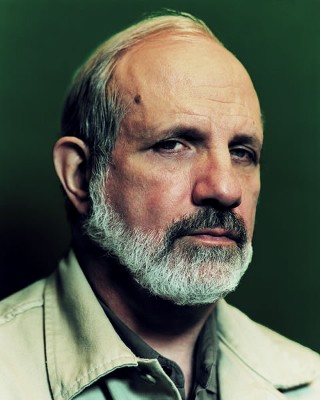Here is my five-minute vampire fever dream, Umbra, and the eighteen-minute promo-doco, REDUX, which tells the curious and amusing story behind Umbra's extraordinary journey from its underground origins in Wellington, New Zealand, twenty-three years ago, to its screening in competition at the prestigious 48th Sitges International Film Festival in 2015.
Brian De Palma
“My films deal with a stylized, expressionistic world that has a kind of grotesque beauty about it.”
Brian De Palma was born in Newark, New Jersey, USA, on September 11th, 1940 to Italian-American parents. Citizen Kane was one of several movies that had a profound impact on him and he subsequently changed his university major from physics to film studies. Whilst at Sarah Lawrence College he had the privilege of being taught by Alfred Hitchcock and Andy Warhol, amongst others.
De Palma was one of the original movie brats; a close group of precociously-talented directors who stormed Hollywood in the early 70s, made movies on their own terms, and delivered a bunch of bonafide classics, influencing scores of future successful directors. The other brats were Martin Scorsese, Francis Ford Coppola, William Friedkin, George Lucas, and Steven Speilberg.
De Palma’s debut feature, Greetings (1968), first brought Robert De Niro to the attention of movie audiences. After several thrillers, in which he cemented his distinct visual style, he brought to the big screen the inaugural adaptation of a Stephen King novel, King’s first, Carrie (1976), and it was a huge success, making stars of John Travolta and Sissy Spacek, and featuring a terrifying turn from Piper Laurie. It was also where he met his future first wife, Nancy Allen, who plays the high school super-bitch.
“Women are more sympathetic creatures in jeopardy, plus they’re more interesting to photograph. I’d rather photograph a woman walking around with a candelabra than a guy. It’s as simple as that. Somebody once said that the history of cinema was made photographing women, and I think one could truthfully say that.”
He continued to refine his signature genre, the thriller, over the next decade, in particular the provocative Dressed To Kill (1980) and the exhilarating Blow Out (1981), sometimes stepping sideways to make an intense drama (with thriller overtones), such as the Oliver Stone-penned gangster masterpiece Scarface (1983) and the David Mamet-penned ode The Untouchables (1987), but also including the black sheep of his career, Wise Guys (1986), a comedy. His career hit a major wall with the release of the adaptation of Tom Wolfe’s incendiary The Bonfire of the Vanities (1990). The film was scuttled by bad casting and numerous re-writes and was uniformly panned by critics.
De Palma has often been criticised for being misogynistic and stealing ideas from earlier directors’ works, chiefly Alfred Hitchcock. De Palma is emphatic that he is simply employing the best way to film a scene or to narrate a story. He is a master of pure cinema; sound and image sans dialogue, and his command of mise-en-scene and elaborate long takes is virtuoso. His reoccurring themes of voyeurism and deception are cinema personified.
“[Alfred Hitchcock] is the one who distilled the essence of film. He’s like Webster. It’s all there. I’ve used a lot of his grammar.”
De Palma made a brilliant return to form with both guns blazing in Carlito’s Way (1993) that worked as dual cannon for Al Pacino, both in gangster revisited mode, and featured a stunning – almost unrecognizable – performance from Sean Penn as a coke-addled lawyer with a perm. Three years later he was gun for hire and enjoyed his most commercially successful movie; a big screen re-boot of 60s television hit Mission: Impossible.
I’m not interested in a lot of talk. Talk to me is very boring and a lot of people just put that up there all the time. You have many films with these long character scenes, with extremely in-depth analysis, and what you have is a lot of characters sitting around talking to each other, which does little to excite me in terms of the possibilities of what you can do with cinema. So I have those sequences in when they’re necessary, but I certainly don’t structure my film around them. And most of cinema today is driven by television, which is all talk – I tend to be the counter-programming director.
Like his old colleague Coppola De Palma’s career has been uneven. He hasn’t made anything truly memorable, possessing that De Palma zing for many years. However his aces – and he has a solid seven or more under his belt – are big black spades indeed. He’s one of very few Hollywood directors to have the privilege of final cut, yet it’s curious to note that Brian De Palma has never contributed a director’s commentary to any of his movies on DVD (he’s also notoriously difficult to interview).
Complete feature filmography with my favourites and/or notables in bold.
Murder a la Mod (1968)
Greetings (1968)
Hi Mom! (1970)
Get To Know Your Rabbit (1970)
Sisters (1973)
Phantom of the Paradise (1974)
Obsession (1976)
Carrie (1976)
The Fury (1978)
Home Movies (1980)
Dressed To Kill (1980)
Blow Out (1981)
Scarface (1983)
Body Double (1984)
Wise Guys (1986)
The Untouchables (1987)
Casualties of War (1988)
The Bonfire of the Vanities (1990)
Raising Cain (1992)
Carlito’s Way (1993)
Mission: Impossible (1996)
Snake Eyes (1998)
Mission to Mars (2000)
Femme Fatale (2002)
The Black Dahlia (2006)
Redacted (2007)
Passion (2012)
“The camera lies all the time; lies 24 times a second.”
